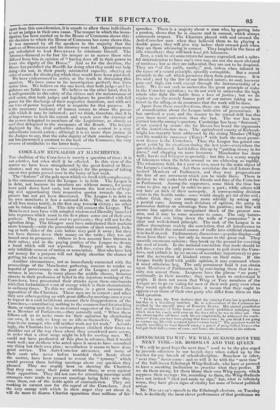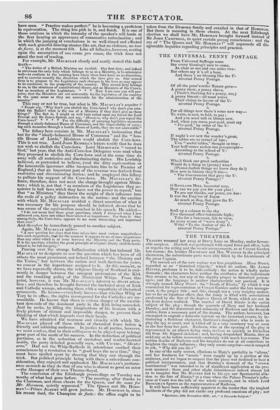EDINBURGH TO WIT: WE WILL BE GOOD BOYS THE NExl."rimE — MR.
11ORSMAN AND THE QUEEN.
" Ws will be good boys the next tine" used to be the plea urged by juvenile offenders in our boyish days when called up by the teacher for any breach of school-discipline. Somehow or other,
next time " never came : and so will it be with the " next time " of the half-dozen Edinburgh Whig-Radicals, who have or pretend to have a sneaking inclination to practise what they profess. If we do them wrong, let them blame their own Whig papers, which suppress their sayings : for, according to them, the Whig-Rachcals have not indeed " died and made no sign," but, what is infinitely worse, they have given signs of vitality but none of honest political action.
Mr. Muster-yes speech to the Edinburgh electors, on Tuesday last, is decidedly the most clever performance of that gentleman we
have seen. " Practice makes perfect :" he is becoming a proficient in equivocation. The thing has pith in it, and finish. It is one of those orations in which the intensity of the speaker's will lends at the first hearing an appearance of consecutive ratiocination ; and in which the jumping at conclusions is so well-timed and effected with such graceful dancing-master-like art, that no violence, no tour de force, is at the moment felt. Like all fidlacies, however, resting upon the assumption of non causa pro cause, the trick does not Stand the test of reading.
For example, Mr. MACAULAY clearly and neatly stated this half- truth— " The duties of a British Ministry are twofold. Our first duty, and indeed in strictness the only duty which belongs to us as a Ministry, is to administer well—to conform to the existing laws where these laws leave us no discretion, and to exercise soundly the discretion which the laws give us. Our second duty is to propose to the Legislature such changes in the laws as may appear to us conducive to the prosperity of the country. This second duty belongs to us, in the strictness of constitutional theory, not as Ministers of the Crown, but as members of the Legislature. * * * Now I am sure you will per- ceive, that the Ministers are not answerable for the legislation of the country in the same sense as they are answerable for the administration of the country." This may or not be true, but what is Mr. MACAULAY'S sequitur ? "People cry, 'Why don't you abolish the Corn-laws ? why don't you esta- blish the Ballot? what is the use of a Ministry if they don't give us these things?' The fact is, I might as well turn round upon my friend the Lord Provost and Sir James Spittal, and say, 'di:busters, why don't you repeal the Corn-laws?' * * * * For the difficulty of carrying legislative measures through a nicely-balanced House of Commons, and the impossibility of carry- ing such measures through a hostile House of Lords, they are not answerable."
The fallacy here consists in Mr. 11mfaxr.Ay's insinuation that but for the " nicely-balanced House of Commons " and the " hos- tile House of Lords," Ministers would abolish the Corn-laws. This is not true. Lord JOHN RUSSELL'S letters testify that he does not wish to abolish the Corn-laws. Lord MELBOURNE " vowed to God," last year, that the Anti-Corn-law Delegates were mad when they proposed to abolish the Corn-laws and at the same time do away with all restrictive and discriminating duties. His Lordship believed, or pretended to believe, (and the dirty equivocation or the lamentable ignorance alike incapacitate him to be Premier of England,) that an important part of the revenue was derived from restrictive and discriminating duties; and he employed this fallacy to palliate his support of the Corn-laws. Mr. 11:ten:I./ties de- fence, therefore, does not meet the charge brought against Minis- ters ; which is, not that " as members of the Legislature they ac- quiesce in bad laws which they have not the power to repeal," but that "as Ministers" they throw the weight of their influence into the scale of a policy destructive to the nation : and the caution with which Mr. MACAULAY avoided a direct assertion of what it was necessary for his purpose should be inferred, shows that he was aware of the equivocation couched in his speech. He added- 4, I do not mean that those great questions, which I discussed when I last addressed you, have lost either their interest or importance, Far from it. One among them, the Corn-laws, appears to me more interesting and important than ever."
And therefore he immediately passed to another subject.
Again, Mr. MACAULAY said— "A new question has since that time arisen into most serious magnitude— into such magnitude, that for the moment it appears to me of more importance than any other which is at issue between time Ministry and the Tory party. It is the question, whether the great principle of religious liberty shall be main- tained in its full integrity." Passing over the strange hallucination which has induced Mr. MACAULAY to designate as new the question which has been of all others the most prominent, not indeed between " the Ministry and the Tories," but between the nation and both fitctions for years, we concur in the importance assigned to it. At this moment, as we have repeatedly shown, the religious liberty of Scotland is emi- nently in danger between the arrogant pretensions of the Kirk and the truckling policy of the Ministerial Whigs. From this point, however, it was Mr. MACAULAY'S interest to divert atten- tion ; and therefore he brought forward the 'mauled story of Irish and Catholic wrongs, adorning them with a superfluity of rhetorical ornaments. lie knows—everybody knows—that whether Whig or Tory be in office, the rights ree We have admitted the neatness and vivacity with which Mr. MACAULAY played off these tricks of rhetorical fence before a, friendly and admiring audience. In justice to all parties, however, we must contbss, that to their/ell/bigness to be played upon belongs great part of the merit of his success. In the seduction of political partisans, as in the seduction of credulous and tender-hearted maids, the party deluded generally says, with CicEtto, " libenter erro." Had not the Whig-Radicals in attendance soothed their consciences by a resolution to be " good boys the next time," they must have spoiled sport by showing that they saw through the trick. But political principle being with them a subordinate con- sideration, they enjoyed and applauded Mr. MACAULAY'S perform- ance as much as they do that of one who is almost as good an actor —the Manager of their own Theatre-Royal. The conclusion of the Edinburgh proceedings on Tuesday was worthy of what had gone before. " The meeting, after thanks to the Chairman, and three cheers for the Queen, and the same for Mr. Horsman, quietly separated." The Queen and Mr. 'lofts- ?SAN !—Prince ALBERT will grow jealous. Mr. HonsmAN is, since his recent duel, the Champion de facto : the office ought to be taken from the DYMOKE family and entailed in that of Honsmax. But there is meaning in these cheers. At the next Edinburgh election we shall have Mr. Honsmax brought forward instead of Sir Jona CAMPBELL, to quiet certain queasy consciences : and the cry of " The Queen and Mr. HorismAN !" will supersede all dis- agreeable inquiries regarding principles and practice.



























 Previous page
Previous page